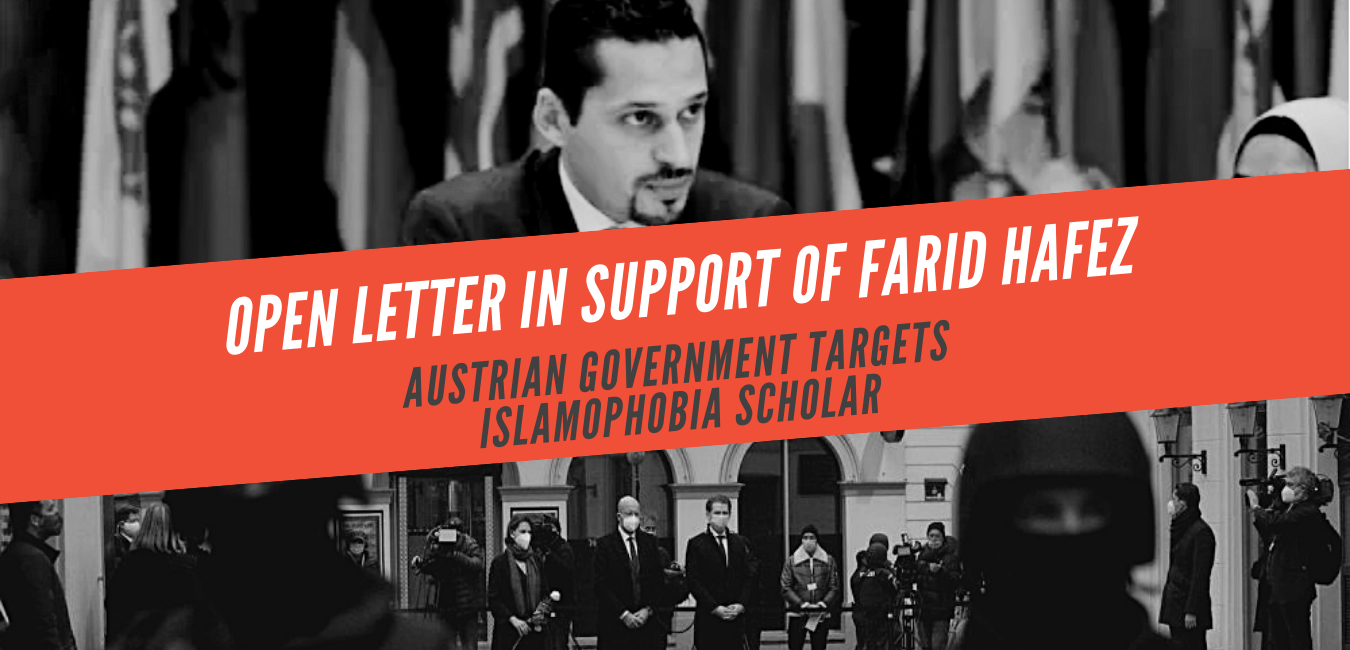
International Statement Opposing Use of Counter-Terrorism Powers to Target Islamophobia Expert
As academics and lawyers, we write to express our deep concern about the Austrian government’s use of counter-terrorism powers to target academics and activists, including the November raid against prominent Islamophobia expert Dr Farid Hafez of the University of Salzburg.
Following the murder of four people on 2 November 2020, the atmosphere of fear was used to legitimize mass raids against Professor Hafez and 29 other people – represented by the Minister of Interior as a “strike against political Islam.” While the rest of the targets remain anonymized, Professor Hafez – the only academic among them – was singled out and targeted as the public face of the operation. In what was the largest raid in Austria since WWII, 930 special forces destroyed his entrance, and woke his children in their bedroom with guns in their hands at 5 o’clock in the morning.
This attempt at intimidation was followed by a nation-wide media campaign against Dr Hafez, in which the Ministers of the Interior and of Integration also participated, damaging his reputation as a globally recognized scholar. While none of the raided individuals have been charged with any crime, the targets remain in a state of legal exception as the State Prosecutor has up to three years to either close the case or file a charge, and Dr Hafez’s bank account and assets have been frozen in the interim.
The raids are a manifestation of the intensification of state Islamophobia in Austria, as exemplified by: the Islam Act of 2015; the ban on hijabs for elementary school students (recently declared unconstitutional by the Constitutional Court); the increasing securitization of Muslim civil society by the secret service; the illegal closing of mosques; tightening of the citizenship law; and the attempt to make political Islam (a term the Austrian government has not defined) a criminal offense. It is precisely the critique of these policies, and its manifestations in state Islamophobia, that the Austrian government wishes to censor and make invisible.
The repression in Austria is not isolated. Rather, it is part of the international rise of authoritarian governmental suppression of Muslim civil society and critical scholarship in Western democracies – as we see in France, for example, where postcolonial and anti-racist scholarship has been attacked by the government under the guise of an inquiry into “Islamo-leftism.” United Nations and other international human rights law experts have repeatedly raised concerns about states’ uses of broad and ever-expanding counter-terrorism powers to suppress academic freedom and dissent.
Thus we urge the State Prosecutor to close the case, and cease its intimidation of Dr Farid Hafez and others who have been wrongly attacked. We urge the political leadership in Austria, especially the Minister of Interior and the Minister of Justice, to appoint an independent investigative commission to investigate this case and issue its findings. And we express our ongoing commitment to supporting critical scholarship on Islamophobia and state racism, including by Professor Hafez and others who continue to produce such scholarship under conditions of state repression.
Authors:
John Esposito, Professor, Georgetown University, USA
Francois Burgat, Professor, Universite Aix en Provence, Directeur CRNS Paris, France
John Bunzl, Professor, Austrian Institute for International Affairs, Austria
Asma Afsaruddin, Professor, Indiana University, USA
Nader Hashemi, Professor, University of Denver, USA
Sahar Aziz, Professor, Rutgers University, USA
Jorgen Nielsen, Prof. em, Universities of Birmingham and Copenhagen, UK/Denmark
Azeezah Kanji, Legal academic and Journalist, Canada

 Search
Search